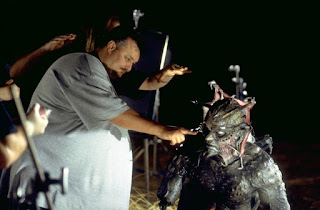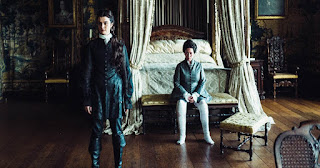"Back in my day!"
I know, nobody likes hearing people hark on about the "good old days" when things were different to how they are now, and why that somehow requires a 20-minute lecture about the abhorrent state of society. But hear me out, because to understand my gripes with the current cinema experience, we have to consider context.
When I was younger, one of the first film's I ever went to see was Pirates of the Caribbean: The Curse of the Black Pearl (2003). I nearly shat my pants when the undead monkey popped up on screen, I cheered through Captain Jack's heroics and laughed at his quips. And aside from the film being everything 8-year old me could hope for, I remember loving the whole experience of visiting my local cinema.
 |
| Geoffrey Rush and co. in Pirates of the Caribbean: The Curse of the Black Pearl (2003) |
Pick-and-mix on tap. Pop music in the foyer. Families laughing and crying at films together. It was a formative part of my childhood to go to a cinema because now I am so in love with films that it's ridiculous: I don't think I would've turned out that way had I not been taken to see things on the big screen.
Now, an important aspect of any cinema visit is snacks. As a kid, we bought things from the concession stand: they were pricey, yes, but actual film tickets cost less than a fiver, so it was a luxury to splurge a bit on that extra large bag of popcorn or gorge yourself on too many chocolate M&Ms. It wasn't a necessity but it was just something you did to add to the experience.
Many of you who still go the cinema will know this, and I will explore it further in a second, but unless you only go the cinema occasionally, frequent movie-goers never buy anything from the concession stands anymore.
Why?
Well, I'd rather not have to take out a fucking loan to buy a small popcorn or sell my organs for a Coke.
Why?
Well, I'd rather not have to take out a fucking loan to buy a small popcorn or sell my organs for a Coke.
Capitalist utopia
Let's fast forward back to the night in question. My friend and I enter the cinema, elated to see Us: I have personally been waiting well over a year to see this film and I've waited nearly a month to actually go because I pre-booked (yes, I was that damn excited).
Because I'd been gifted a voucher for my birthday, I had a little bit to spend of snacks: a rarity at this point because, as aforementioned, you don't buy food at cinemas anymore. The price of food is extortionate, to the point where people (including myself) often buy snacks in bulk from local corner shops before ever entering the cinema.
 |
| Average annual cinema ticket price in the UK from 2000-2017 (in GBP) |
You smuggle in your 99p chocolate to enjoy alone or with others because, seeing as cinema tickets now can cost anywhere up to £8 in the UK according to statistics dated in 2017 (though my local cinema charges up to £14 for an adult ticket, which is double the average), snacks are just not feasible. It's not stingy to turn around and refuse to pay £4.35 for a small popcorn when you can buy a bag from your local Tesco for a quid: that's called using your common sense.
Anyway, my friend and I decide to indulge ourselves in buying pick-and-mix: you're never too old for slightly chalky sweets that may or may not have been manhandled by a curious toddler beforehand. We chuck a couple of the ol' favourites in (I personally like chocolate mice, raisins and Smarties) and then go over to the register. To my absolute horror, she rings the bill up at £10. For pick-and-mix.
I give a nervous chuckle and just pay what I can off my voucher card and then pay the rest by debit but my god, what kind of absolute madman must you be to price your sweets that high? Who on earth would pay for that? I know damn well my parents never would have bought me a bag of glorified corner shop sweets at a cinema if it meant costing them an arm and a leg to do so.
Cinema etiquette
So, at this point, my bank account is weeping in the background and I'm slightly disgruntled. But I acknowledge that this happens, that the average cinema is designed for #consumeristlife, so spending money is going to inevitably happen (even if it means throwing away £10 on fucking pick-and-mix).
On to the best part: watching the film.
There's an unspoken rule, I believe, when it comes to seeing a film in public: be respectful of the audience. That means if you're watching something suspenseful, don't bring in bags of food that make a lot of noise. If you're seeing something subtitled (or, in my opinion, any film, subtitled or not), don't talk during the runtime. And the absolute obvious one: don't use your bloody phones. Don't take them out. Don't even have them on, unless you have to in case of emergencies.
 |
| "Maybe. Maybe not. Maybe go fuck yourself." - The Departed (2006) |
When we went to see Us, not only did people rustle behind us with their popcorn and crisps and whatnot, not only did people talk over the film when there were suspenseful moments and important, expositional dialogue, but they committed what I consider to be the worst of cinema sins: a couple of people were on their phones.
I watched one girl scrolling through her Insta feed and thought, "why the fuck are you here?"
Who pays this amount of money on a film and accompanying snacks to just...not watch the film? If you wanted to scroll through social media at your leisure and half-ass watch something, do it at home where you're not bothering anybody else. And I'm not trying to be some kind of elitist when it comes to cinema experiences, I just believe that it's "cinema etiquette".
I spoke to my best friend and fellow cinephile, Lili (@cinemellon) on her experiences with outlandish and rude cinema patrons, and she very kindly told me her experience when it came to seeing Hereditary (2018):
"When the film began, everything in the screen was fine, and during the first 20 minutes, everyone seemed to share the same sense of quiet tension with occasional nervous laughs.
However, as the film went on, younger audience members started laughing at serious moments, talking loudly over dialogue, making jokes and making disruptive sounds. All of this was extremely distracting and I was completely thrown off. I was getting more and more angry and wasn't able to enjoy the film at all, no matter how hard I tried to focus.
I loved what I was seeing on screen but, after a while, I was just overcome by rage and sadness, wishing I would have waited until the DVD release.
Don't get me wrong, laughter alone would have been perfectly fine, but people were actively making fun of the film and ignoring the possibility that some people might actually want to pay attention and enjoy the experience they paid almost £15.
As soon as the credits rolled, I stood up and stormed the hell out of there."
Who pays this amount of money on a film and accompanying snacks to just...not watch the film? If you wanted to scroll through social media at your leisure and half-ass watch something, do it at home where you're not bothering anybody else. And I'm not trying to be some kind of elitist when it comes to cinema experiences, I just believe that it's "cinema etiquette".
I spoke to my best friend and fellow cinephile, Lili (@cinemellon) on her experiences with outlandish and rude cinema patrons, and she very kindly told me her experience when it came to seeing Hereditary (2018):
"When the film began, everything in the screen was fine, and during the first 20 minutes, everyone seemed to share the same sense of quiet tension with occasional nervous laughs.
However, as the film went on, younger audience members started laughing at serious moments, talking loudly over dialogue, making jokes and making disruptive sounds. All of this was extremely distracting and I was completely thrown off. I was getting more and more angry and wasn't able to enjoy the film at all, no matter how hard I tried to focus.
I loved what I was seeing on screen but, after a while, I was just overcome by rage and sadness, wishing I would have waited until the DVD release.
Don't get me wrong, laughter alone would have been perfectly fine, but people were actively making fun of the film and ignoring the possibility that some people might actually want to pay attention and enjoy the experience they paid almost £15.
As soon as the credits rolled, I stood up and stormed the hell out of there."
Why bother, then?
The question you might now be asking is, "well why do you even go to the cinema then?"
Good question. The answer is simple: I don't.
And that's absolutely not to discourage anybody else from going because when I used to go to the cinema, I would stroll through those popcorn-scented corridors with my rose-tinted glasses firmly wedged onto my face, and I don't see any reason why other people shouldn't experience that.
My argument here is that...well, I don't get that experience anymore. Cinema has become so deeply imbedded in capitalism and profiting off their audience rather than setting up the perfect fairytale-esque experience that most people deeply crave when they go to see a film.
There has been a debate recently on whether Roma (2018) should have ever qualified for being at the Oscars, considering it's a Netflix film: of course it does, it's a film that elicits strong, powerful emotions, directed by (in my opinion) one of the most visionary and kind directors of our generation. Of course it has a place at the Oscars, an award show that celebrates cinema, people. And a damn sight more filmgoers were able to see it because they were able to access Roma in the comfort of their homes for a considerably cheaper fee.
I understand that money has to factor into filmmaking: we wouldn't have films otherwise. But when did cinemas start to lose that magical edge? When did they forget why people came to see films at their establishments in the first place?
Because, as it stands, I only ever visit cinemas around once or twice a year. And it's not for the popcorn.
- K















